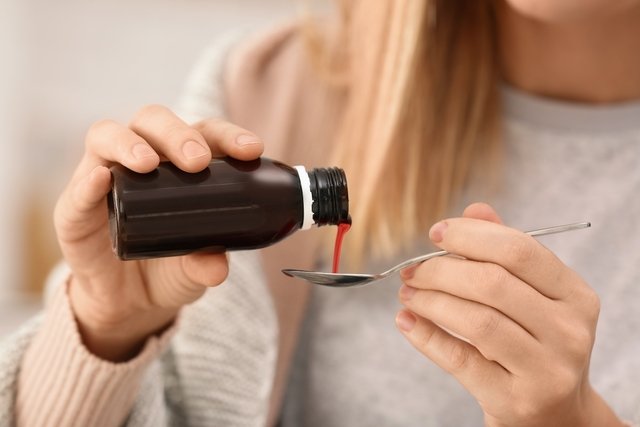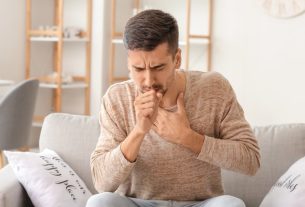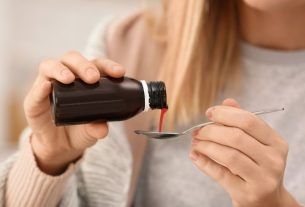Dry cough syrups, such as dropropizine, dexchlorpheniramine or clobutinol + doxylamine, can help relieve irritation in the throat or airways, caused by allergies, flu or colds, for example.
A dry cough is a symptom that occurs as a result of the body’s natural reflex to protect the lungs and clear the airways of irritants such as dust or pollen, or infections such as pneumonia or bronchitis.
Dry cough syrups should be used with the advice of a pediatrician, pulmonologist or otorhinolaryngologist, especially in children, after evaluating the cause of the cough, and other remedies may also be indicated.
Top dry cough syrups
The main syrups for dry and allergic coughs are:
1. Dropropizin
Dropropizine syrup is an antitussive indicated for dry, allergic and irritating coughs, without phlegm, caused by allergies, infections, inflammations or irritations of the respiratory tract.
This syrup prevents the cough reflex, helping to relieve dry and allergic coughs. It is available as a generic or under the names Notuss, Vibral, Ecos or Neotoss and should be used with medical advice.
Dropropizine syrup has different concentrations, 1.5 mg/mL for use in children over 2 years old and 3 mg/mL for adults or children over 12 years old.
How to use: The dose of dropropizine children’s syrup 1.5 mg/mL for children between 2 and 3 years old is 2.5 to 5 mL, which corresponds to ¼ to ½ dosing syringe, 4 times a day, as instructed by the pediatrician. For children over 3 years old, the recommended dose is 10 mL (1 dosing syringe), 4 times a day. See also the dose of dropropizine for adults.
2. Clobutinol + doxilamina
Clobutinol + doxylamine dry cough syrup is indicated for any type of allergic cough without phlegm, caused by flu, colds, allergic rhinopharyngitis or respiratory tract irritation due to pollution or smoking, for example.
Clobutinol works to reduce irritating dry coughs and doxylamine has an anti-allergic action that reduces the amount of liquids on the walls of the airways, relieving coughs and allergies.
This syrup contains 4 mg/mL of clobutinol and 0.75 mg/mL of doxylamine, and can be used by adults or children over 2 years old, and is found under the name Hytoss Plus.
How to use: the dose for adults and children over 12 years of age is 10 mL of syrup, up to 3 times a day. For children aged 3 to 12 years, doses of 5 mL to 10 mL are recommended, up to 3 times a day.
3. Loratadine
Loratadine is an anti-allergy syrup indicated to relieve the symptoms of allergic rhinitis, flu or colds, such as dry cough, itchy nose or eyes, runny nose or sneezing.
This syrup for dry and allergic coughs can be found in pharmacies as a generic or under the trade names Alergaliv, Loratamed, Histadin or Histamix, for example.
How to use: The doses of loratadine syrup 1 mg/mL for adults or children over 12 years of age are 10 mL of syrup, once a day. For children aged 2 to 12 years, doses vary according to body weight. Find out how to take loratadine.
4. Dexchlorpheniramine
Dexchlorpheniramine dry cough syrup is indicated to relieve allergic cough caused by allergic rhinitis.
This syrup can be used by adults or children over 2 years of age, and is found in its generic form or under the names Polaramine, Celerg or Histamin, for example.
How to use: The recommended doses for adults are 5 mL of dexchlorpheniramine syrup 0.4 mg/mL, 3 to 4 times a day, according to medical advice. For children aged 2 to 12 years, doses must be advised by the pediatrician. See how to take dexchlorpheniramine.
5. Levodropropizine
Levodropropizine dry cough syrup is indicated for dry, irritating coughs due to bronchitis or laryngitis, also helping to relieve allergic coughs.
Levodropropizine inhibits the cough reflex, relaxes bronchial muscles and improves pulmonary ventilation.
Levodropropizine syrup can be found under the names Antux or Percof, containing 30 mg/5mL or 6 mg/mL of levodropropizine and can be used by adults or children over 2 years of age.
How to use: the dose for adults or children over 12 years of age is 10 mL of syrup, up to 3 times a day, as per medical advice. For children between 2 and 12 years old, the dose should be calculated according to body weight. Find out how to take levodropropizine correctly.
6. Cloperastina
Cloperastine syrup is indicated for all types of dry cough, without a defined cause and/or without phlegm production.
This syrup works by inhibiting the cough center, which is a region in the brain responsible for coughing, in addition to reducing irritation of the bronchi and relaxing the bronchial muscles.
Cloperastine syrup can be found under the name Seki 3.54 mg/mL and should be used under medical advice.
How to use: the normally recommended dose of Seki syrup for adults is 10 mL, 3 times a day, up to a maximum of 40 mL per day, as per medical advice. For children up to 12 years of age, doses should be calculated according to body weight. Find out how to give cloperastine syrup to children.
7. Oxomemazina
Oxomemazine hydrochloride, potassium iodide, sodium benzoate and guaifenesin syrup is indicated for dry, irritating and spasmodic coughs caused by various respiratory conditions.
This syrup has an antitussive, cough sedative, antiseptic action for the respiratory tract and thins bronchial secretions, which leads to relief from irritating dry coughs.
The syrup of oxomemazine hydrochloride, potassium iodide, sodium benzoate and guaifenesin can be found under the name Expec and can be used by adults or children over 2 years of age.
This syrup must be used under medical advice and is contraindicated in cases of respiratory failure or severe liver and kidney diseases.
How to use: the recommended dose for adults is 5 mL of syrup, up to 6 times a day. For children aged 6 to 12 years, the dose is 5mL, 4 to 6 times a day. For children aged 2 to 6 years, the dose is 5mL, 3 to 4 times a day.
8. Desloratadina
Desloratadine syrup is another syrup indicated to relieve the symptoms of allergic rhinitis, which includes dry and allergic cough, runny or stuffy nose, or itchy nose.
This syrup can be found under the names Esalerg, Desalex Aloff or Leg, for example, containing 0.5 mg/mL of desloratadine, and must be used under medical advice.
How to use: the recommended dose for adults is 10 mL of desloratadine syrup 0.5 mg/mL, once a day, or as directed by the doctor. See also doses of desloratadine syrup for children.
9. Drosera
Drosera syrup is a homeopathic dry cough syrup found in association with other substances such as Anemone Pulsatilla, Rumex crispus, Bryonia dioica, Ipecacuanha, Toasted sponge, Pulmonary sticta, Tartaric antimony e Cuckoo cacti.
This syrup, sold under the trade name Stodal, helps reduce throat irritation, relieving dry coughs, and can be used by adults or children over 2 years of age.
How to use: The normally recommended doses for adults are 15mL, 3 to 5 times a day. If symptoms do not improve within 3 days, you should see your doctor again.
Stodal syrup also has an expectorant action and can be used for coughs with phlegm. See all cough syrups for phlegm.
Children’s dry cough syrup
Children’s dry cough syrups that may be recommended by the pediatrician for children over 2 years old are dropropizine, loratadine or levodropropizine, for example.
These syrups should only be used with a pediatrician’s recommendation after evaluating the cause of the dry cough, which may be due to respiratory problems, such as asthma, sinusitis and allergic rhinitis, or even gastric problems, such as gastroesophageal reflux. Check out the main causes of dry cough in babies.
Homemade dry cough syrup
Some homemade dry cough syrups, such as carrot syrup with honey or honey and lemon syrup, help moisturize the throat and have calming properties, reducing the cough reflex naturally.
These homemade syrups can be used to complement medical treatment, not replacing medicines or syrups recommended by the doctor. Learn how to prepare homemade dry cough syrups.
Care when using syrups
Some precautions are important when using dry cough syrups, such as using the correct dose recommended by the doctor, following the treatment for the recommended time, in addition to avoiding giving syrups or other medicines to children without the pediatrician’s recommendation.
Furthermore, pregnant or breastfeeding women should only use syrups or other medicines if indicated by their doctor, as some substances can interfere with the development of the fetus or pass to the baby through the milk.
In these cases, a good way to stop coughing is to increase your fluid intake, such as water, juices or soups, inhale or wash your nose with saline solution, in addition to avoiding contact with allergenic substances, which may be causing a dry cough. . See other ways to stop coughing.
When to go to the doctor
You should consult your pediatrician, otorhinolaryngologist or pulmonologist in the following situations:
- Persistent dry cough;
- Intense cough that can cause vomiting;
- Feeling of shortness of breath;
- Panting;
- Wheezing in the chest when breathing;
- Difficulty sleeping;
- Cough that worsens when lying down;
- Chest pain;
- Fever or chills.
In addition, you should also consult a doctor in cases of throat irritation, constant sneezing, a blocked or runny nose, or pain in the nasal sinuses.
Therefore, the doctor must evaluate the symptoms, identify the cause of the dry cough and recommend the best syrup and/or other remedies. Check out the main causes of dry cough.

Sign up for our newsletter and stay up to date with exclusive news
that can transform your routine!
Warning: Undefined array key "title" in /home/storelat/public_html/wp-content/plugins/link-whisper-premium/templates/frontend/related-posts.php on line 12
Warning: Undefined array key "title_tag" in /home/storelat/public_html/wp-content/plugins/link-whisper-premium/templates/frontend/related-posts.php on line 13




